Impatiens species
Impatiens
Impatiens are the go-to choice for color in the shade, even full shade. Can be grown as a perennial in frost-free regions, but usually grown as a bedding plant annual. Set out from nursery packs or containers in spring.
[Read More]
Iris x germanica
Bearded Iris
There are extremely wide range of Iris selections available, in many colors and sizes. Select carefully according to specific space and exposures; better with some shade in hot climates. Canopy coverage: 3 square feet.
[Read More]Kniphofia uvaria
Red-Hot Poker
Red-hot Poker has an upright, clumping form. Dramatic flowers change color as they age: Blooms are first red then mature to yellow, making the tall flower stalks a two-toned affair. Hybrids are available in a range of colors. It doesn't like "wet feet" so provide with well-drained soil and don't overwater. Canopy coverage: 7 square feet.
[Read More]Lamium maculatum
Dead Nettle
A good choice for a shady location. Especially effective when "lighting up" a shadowy border due to its light colored foliage and flowers. Remains evergreen in mild climates. Canopy coverage: 7 square feet.
[Read More]Lantana 'New Gold'
New Gold Lantana
Tireless bloomer with flowers spring, summer, fall and winter in frost-free climates. Foliage may cause skin irritation. Canopy coverage: 7 square feet.
[Read More]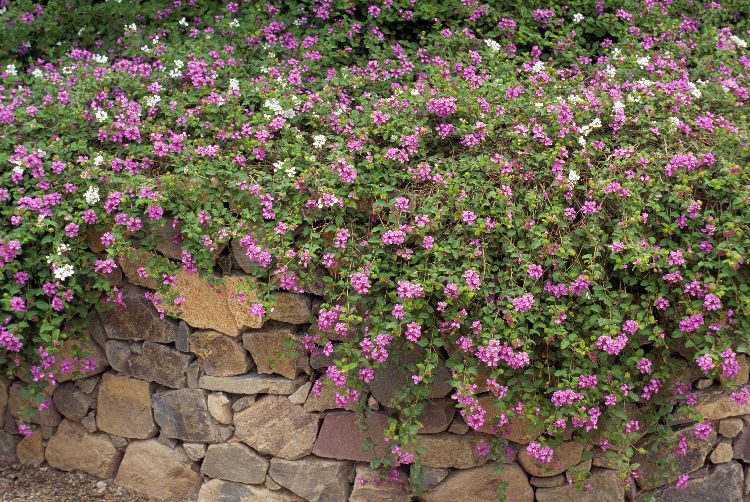
Lantana montevidensis
Trailing Lantana
Lantana has a long blooming season—spring into fall where winters are mild. Excellent groundcover or allow to drape over a ledge or large container. Canopy coverage: 7 square feet.
[Read More]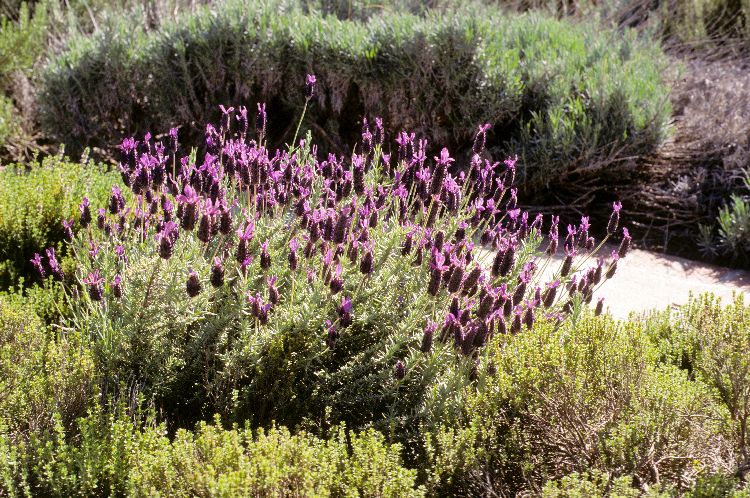
Lavandula stoechas
Spanish Lavender
Spanish Lavender is the most heat-tolerant lavender but prefers some afternoon shade in hot-summer regions. Both flowers and foliage emit the appealing lavender scent, especially when brushed or bruised. Canopy coverage: 7 square feet.
[Read More]Lavandula x intermedia 'Grosso'
Blue Lavandin
This lavender is a hybrid between two Lavender species. Form is more mounding and with branching stems compared to other species. A heat-tolerant selection. 'Grosso' is highly fragrant, and is widely grown commercially in France. Canopy coverage: 7 square feet.
[Read More]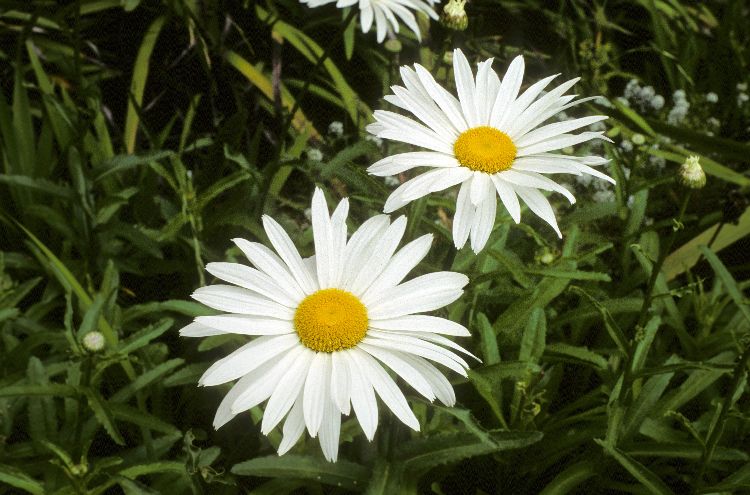
Leucanthemum x superbum
Shasta Daisy
Large white flowers with yellow centers make Shasta Daisy a featured flower in an old-fashioned perennial border. Excellent flowers for cutting. The selection 'White Knight' is smaller and more compact, but tends to be short-lived. Many improved selections are now available that are superior to Shasta Daisy; check with your nursery. Canopy coverage: 3 square feet.
[Read More]Linum lewisii
Blue Flax
Blue Flax is a short-lived perennial wildflower. Sow seeds directly where you want plants to grow in the fall. Reseeds readily to extend plantings. Additional water extends bloom period. Canopy coverage: 3 square feet.
[Read More]Lobelia erinus
Lobelia
Lobelia is a cold-tender perennial grown as an annual. It is low-growing and offers flowers in pleasing shades of blue. Nice when used in containers to drape over the edges. Can sometimes reseed to extend plantings.
[Read More]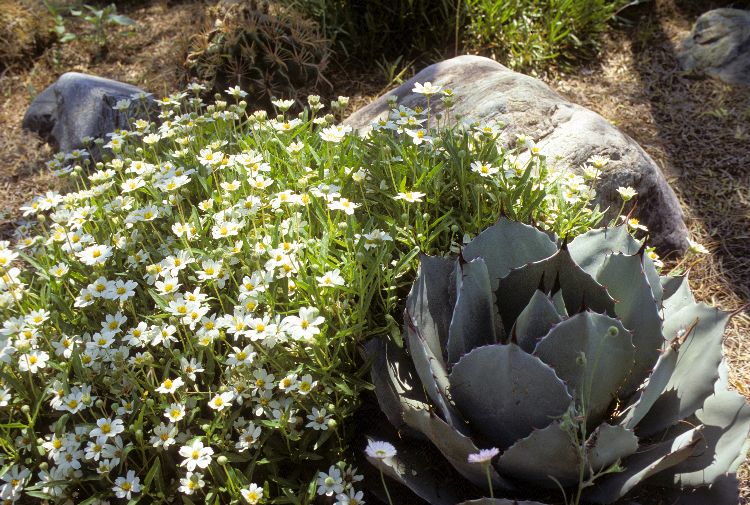
Melampodium leucanthum
Blackfoot Daisy
The growth habit of Blackfoot Daisy is a low mound. Daisylike flowers with yellow centers bloom almost year-round. Attractive planted among boulders or in rock gardens. Canopy coverage: 3 square feet.
[Read More]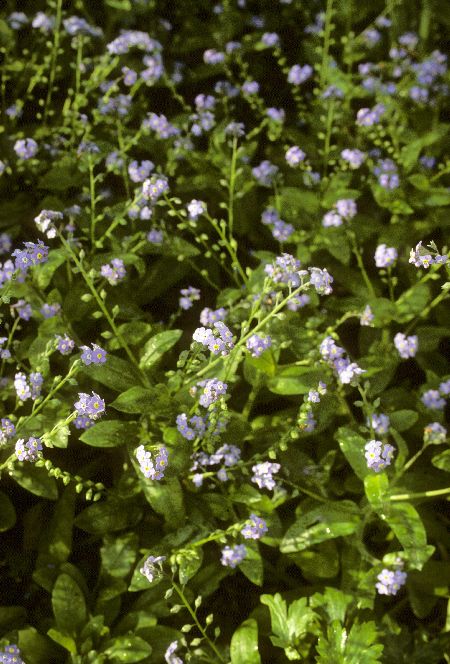
Myosotis sylvatica
Forget Me Not
Forget Me Not is a shortlived perennial often grown as an annual. It produces profuse numbers of small blue flowers in spring. Easy to start from seed; plant seeds where you want plants to grow in the fall.
[Read More]Nepeta racemosa
Catmint
This species is notorious for reseeding vigorously, so be aware plants may turn up where you don't want them. Improved selections are available; 'Walker's Low' makes a good groundcover. Also see Nepeta x faassenii, which produces sterile seeds. Canopy coverage: 3 square feet.
[Read More]Nepeta x faassenii
Faassen's Catmint
This Catmint hybrid is sterile, so does not set viable seed. It is an improved selection compared to Nepeta racemosa. Best with some protection from the sun in hot summer regions. Canopy coverage: 3 square feet.
[Read More]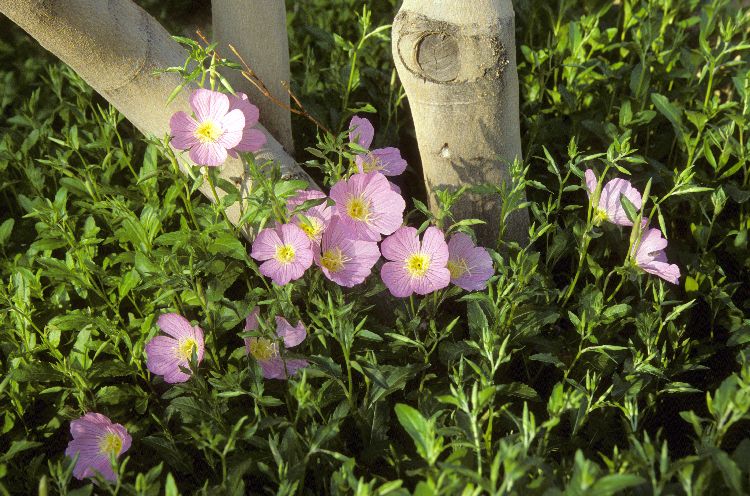
Oenothera berlandieri
Mexican Evening Primrose
The large, bright to dark pink flowers of Mexican Evening Primrose are profuse in spring. It evokes a lush, subtropical appearance. It is known to be invasive, so plant in containers or easily contained area. Freezes to the ground with cold temperatures but regrows the following spring. 'Siskiyou' is an improved selection. Canopy coverage: 13 square feet.
[Read More]Oenothera caespitosa
Tufted Evening Primrose
This Primrose blooms in the late afternoon and evening hours, so locate it near outdoor living areas or entries where it can be enjoyed. Flowers are fragrant, and can reach up to 4 inches across. Canopy coverage: 7 square feet.
[Read More]Oenothera macrocarpa
Missouri Evening Primrose
Missouri Evening Primrose produces large, 4-inch flowers that are pure yellow. Flowers last only one day, but because flowering is so profuse it is hard to notice. Accepting of tough conditions. Better with afternoon shade in hottest climates. Canopy coverage: 3 square feet.
[Read More]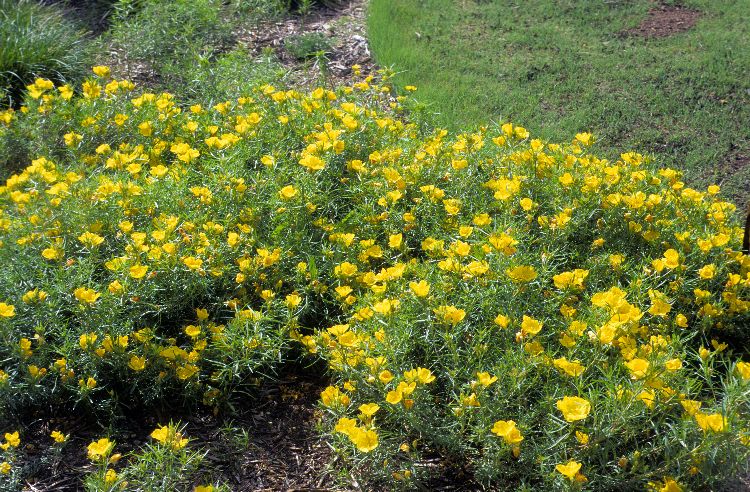
Oenothera stubbei
Saltillo Primrose
This is a colorful, fast-growing groundcover with a clumping growth habit. The fragrant yellow flowers open in late afternoon until the following morning. Canopy coverage: 7 square feet.
[Read More]Origanum vulgare
Common Oregano
Common Oregano, also known as Wild Marjoram, is variable regarding leaf scent and culinary flavor. Color comes from flowers as well as bracts, which are modified leaves that surround flowers. Spreads and reseeds on its own. May die down with winter cold but comes back from the roots. Useful in cooking. Canopy coverage: 7 square feet.
[Read More]Pelargonium x hortorum
Garden Geranium
Geraniums are perennials typically grown as annuals in hot-summer or cold-winter regions. Plant from containers or packs in spring. These are old-fashioned plants that are grown as bedding plants, hanging baskets or even houseplants. Also look for scented geraniums, which are available in many rich fragrances.
[Read More]